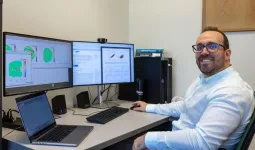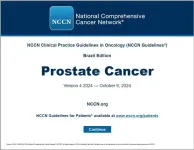(Press-News.org) New artificial intelligence (AI) models for plasma heating can do more than was previously thought possible, not only increasing the prediction speed 10 million times while preserving accuracy, but also correctly predicting plasma heating in cases where the original numerical code failed. The models will be presented on October 11 at the 66th Annual Meeting of the American Physical Society Division of Plasma Physics in Atlanta.
“With our intelligence, we can train the AI to go even beyond the limitations of available numerical models,” said Álvaro Sánchez-Villar, an associate research physicist at the U.S. Department of Energy’s (DOE) Princeton Plasma Physics Laboratory (PPPL). Sánchez-Villar is the lead author on a new peer-reviewed journal article in Nuclear Fusion about the work. It was part of a project that spanned five research institutions.
The models use machine learning, a type of AI, to try to predict the way electrons and ions in a plasma behave when ion cyclotron range of frequency (ICRF) heating is applied in fusion experiments. The models are trained on data generated by a computer code. While much of the data agreed with past results, in some extreme scenarios the data wasn’t what they expected.
“We observed a parametric regime in which the heating profiles featured erratic spikes in rather arbitrary locations,” said Sánchez-Villar. “There was nothing physical to explain those spikes.”
New artificial intelligence (AI) models for plasma heating can do more than was previously thought possible, not only increasing the prediction speed 10 million times while preserving accuracy, but also correctly predicting plasma heating in cases where the original numerical code failed. The models will be presented on October 11 at the 66th Annual Meeting of the American Physical Society Division of Plasma Physics in Atlanta.
“With our intelligence, we can train the AI to go even beyond the limitations of available numerical models,” said Álvaro Sánchez-Villar, an associate research physicist at the U.S. Department of Energy’s (DOE) Princeton Plasma Physics Laboratory (PPPL). Sánchez-Villar is the lead author on a new peer-reviewed journal article in Nuclear Fusion about the work. It was part of a project that spanned five research institutions.
The models use machine learning, a type of AI, to try to predict the way electrons and ions in a plasma behave when ion cyclotron range of frequency (ICRF) heating is applied in fusion experiments. The models are trained on data generated by a computer code. While much of the data agreed with past results, in some extreme scenarios the data wasn’t what they expected.
“We observed a parametric regime in which the heating profiles featured erratic spikes in rather arbitrary locations,” said Sánchez-Villar. “There was nothing physical to explain those spikes.”
“This means that, practically, our surrogate implementation was equivalent to fixing the original code, just based on a careful curation of the data,” said Sánchez-Villar. “As with every technology, with an intelligent use, AI can help us solve problems not only faster, but better than before, and overcome our own human constraints.”
As expected, the models also improved the computation times for ICRF heating. Those times fell from roughly 60 seconds to 2 microseconds, enabling faster simulations without notably impacting the accuracy. This improvement will help scientists and engineers explore the best ways to make fusion a practical power source.
Other researchers on the project include Zhe Bai, Nicola Bertelli, E. Wes Bethel, Julien Hillairet, Talita Perciano, Syun’ichi Shiraiwa, Gregory M. Wallace and John C. Wright. The work was supported by the U.S. Department of Energy under Contract Number DE-AC02-09CH11466. This research used resources of the National Energy Research Scientific Computing Center (NERSC) operated under Contract No. DE-AC02-05CH11231 using NERSC Award FES m3716 for 2023.
END
New AI models of plasma heating lead to important corrections in computer code used for fusion research
Researchers find an effective alternative to overcome modeling limitations using machine learning
2024-10-09
ELSE PRESS RELEASES FROM THIS DATE:
Study: Rise in English learner students in “new destination” states helps, does not hurt, academic outcomes for existing students
2024-10-09
Washington, October 9, 2024—English learner (EL) students represent the fastest growing student group in the United States over the past two decades, with numbers of EL students in public schools soaring in “new destination” states across the South and Midwest. Some commentators have expressed concerns about the possible adverse effect of immigrant students on current students if they require additional resources that are diverted from their peers.
However, a new study finds significant positive spillover effects ...
LANDFEED project kicks off: Transforming agro-food waste into bio-based fertilizers to support Europe’s circular economy
2024-10-09
The LANDFEED project, co-funded by the European Union, held its official kick-off meeting on 12-13 September in Bilbao, Spain. Coordinated by Miriam Pinto from NEIKER, LANDFEED brings together experts across Europe to implement sustainable, circular solutions to Europe’s waste challenges, helping to increase the continent's self-sufficiency in agricultural resources while reducing environmental impact.
LANDFEED will focus on converting under-utilised waste from the agri-food industry, forestry, urban centres, and the natural environment into ...
Mcity opens for remote testing of autonomous vehicle technologies, calls for federal standards
2024-10-09
Images/Videos
As Mcity begins welcoming researchers in autonomous and connected vehicle technologies from around the U.S. to be remote users of its physical and virtual testing environment, its leadership is calling for federal standards for safety testing, arguing that the lack of clear goalposts is hampering development.
The opening also coincides with a new industry partnership project announced at the NVIDIA AI Summit.
Following two years of upgrades, the University of Michigan's hub for autonomous testing has officially kicked ...
Adding vagus nerve stimulation to training sessions may boost how well sounds are perceived
2024-10-09
Just as a musician can train to more sharply distinguish subtle differences in pitch, mammals can improve their ability to interpret hearing, vision, and other senses with practice. This process, which is called perceptual learning, may be enhanced by activating a major nerve that connects the brain to nearly every organ in the body, a new study in mice shows.
Led by researchers at NYU Langone Health, the investigation centers on the vagus nerve, which carries signals between the brain and the heart, digestive system, and other organs. Experts have long explored targeting this nerve with ...
ACS president comments on award of 2024 Nobel Prize in Chemistry
2024-10-09
WASHINGTON, Oct. 9, 2024 — On behalf of the American Chemical Society (ACS), President Mary K. Carroll congratulates today’s winners of the Nobel Prize in Chemistry: David Baker, of the University of Washington; Demis Hassabis, of Google DeepMind; and John M. Jumper, of Google DeepMind. The Royal Swedish Academy of Sciences awarded the prize with one half to Baker “for computational protein design” and the other half jointly to Hassabis and Jumper “for protein structure prediction.”
“This incredibly complex problem of predicting the 3D structures of proteins from the sequence of amino acids has been one of the biggest challenges ...
Effect of tele-ICU on clinical outcomes of critically ill patients
2024-10-09
About The Study: Daily multidisciplinary rounds conducted by a board-certified intensivist through telemedicine did not reduce intensive care unit (ICU) length of stay in critically ill adult patients.
Corresponding Author: To contact the corresponding author, Adriano J. Pereira, M.D., Ph.D., email adrianojop@einstein.br.
To access the embargoed study: Visit our For The Media website at this link https://media.jamanetwork.com/
(doi:10.1001/jama.2024.20651)
Editor’s Note: Please ...
Restrictive vs liberal transfusion strategy in patients with acute brain injury
2024-10-09
About The Study: Patients with acute brain injury and anemia randomized to a liberal transfusion strategy were less likely to have an unfavorable neurological outcome than those randomized to a restrictive strategy.
Corresponding Author: To contact the corresponding author, Fabio Silvio Taccone, MD, PhD, email fabio.taccone@ulb.be.
To access the embargoed study: Visit our For The Media website at this link https://media.jamanetwork.com/
(doi:10.1001/jama.2024.20424)
Editor’s Note: Please see the article for additional information, including other authors, author contributions and affiliations, conflict ...
Extracorporeal blood purification and acute kidney injury in cardiac surgery
2024-10-09
About The Study: The use of a nonselective extracorporeal blood purification device connected to the cardiopulmonary bypass circuit in a nonemergent population of patients undergoing cardiac surgery was associated with a significant reduction of cardiac surgery–associated acute kidney injury in the first 7 days after surgery.
Corresponding Author: To contact the corresponding author, Xose L. Perez-Fernandez, PhD, MD, email xose74@gmail.com.
To access the embargoed study: Visit our For The Media website ...
Frequency of screening and spontaneous breathing trial techniques
2024-10-09
About The Study: Among critically ill adults who received invasive mechanical ventilation for more than 24 hours, screening frequency (once-daily vs more frequent screening) and spontaneous breathing trial (SBT) technique (pressure-supported vs T-piece SBT) did not change the time to successful extubation. However, an unexpected and statistically significant interaction was identified; protocolized more frequent screening combined with pressure-supported SBTs increased the time to first successful ...
International collaboration addresses rising cancer rates in South America
2024-10-09
PLYMOUTH MEETING, PA [October 9, 2024] — The National Comprehensive Cancer Network® (NCCN®)—an alliance of leading cancer centers in the United States—announces a renewed collaboration with the Latin American Cooperative Oncology Group (LACOG) to improve cancer outcomes in South America. The international oncology organizations worked together to publish new NCCN Clinical Practice Guidelines in Oncology (NCCN Guidelines®) for Prostate Cancer: Brazil Edition.
The NCCN Guidelines® for Prostate Cancer: Brazil Edition are now available free-of-charge at NCCN.org/global. Additional Brazilian adaptations of NCCN Guidelines ...
LAST 30 PRESS RELEASES:
Children born with upper limb difference show the incredible adaptability of the young brain
How bacteria can reclaim lost energy, nutrients, and clean water from wastewater
Fast-paced lives demand faster vision: ecology shapes how “quickly” animals see time
Global warming and heat stress risk close in on the Tour de France
New technology reveals hidden DNA scaffolding built before life ‘switches on’
New study reveals early healthy eating shapes lifelong brain health
Trashing cancer’s ‘undruggable’ proteins
Industrial research labs were invented in Europe but made the U.S. a tech superpower
Enzymes work as Maxwell's demon by using memory stored as motion
Methane’s missing emissions: The underestimated impact of small sources
Beating cancer by eating cancer
How sleep disruption impairs social memory: Oxytocin circuits reveal mechanisms and therapeutic opportunities
Natural compound from pomegranate leaves disrupts disease-causing amyloid
A depression treatment that once took eight weeks may work just as well in one
New study calls for personalized, tiered approach to postpartum care
The hidden breath of cities: Why we need to look closer at public fountains
Rewetting peatlands could unlock more effective carbon removal using biochar
Microplastics discovered in prostate tumors
ACES marks 150 years of the Morrow Plots, our nation's oldest research field
Physicists open door to future, hyper-efficient ‘orbitronic’ devices
$80 million supports research into exceptional longevity
Why the planet doesn’t dry out together: scientists solve a global climate puzzle
Global greening: The Earth’s green wave is shifting
You don't need to be very altruistic to stop an epidemic
Signs on Stone Age objects: Precursor to written language dates back 40,000 years
MIT study reveals climatic fingerprints of wildfires and volcanic eruptions
A shift from the sandlot to the travel team for youth sports
Hair-width LEDs could replace lasers
The hidden infections that refuse to go away: how household practices can stop deadly diseases
Ochsner MD Anderson uses groundbreaking TIL therapy to treat advanced melanoma in adults
[Press-News.org] New AI models of plasma heating lead to important corrections in computer code used for fusion researchResearchers find an effective alternative to overcome modeling limitations using machine learning


